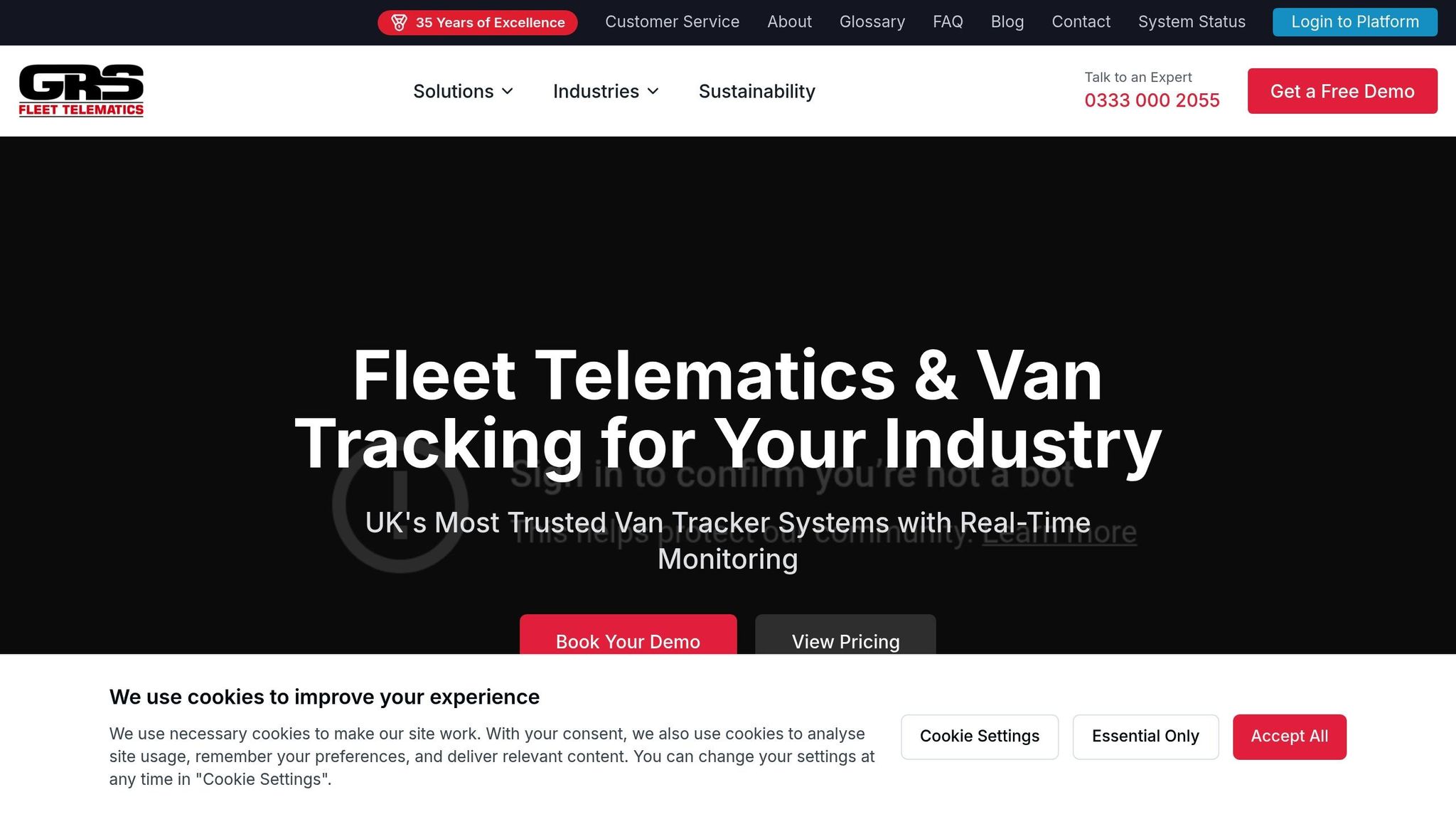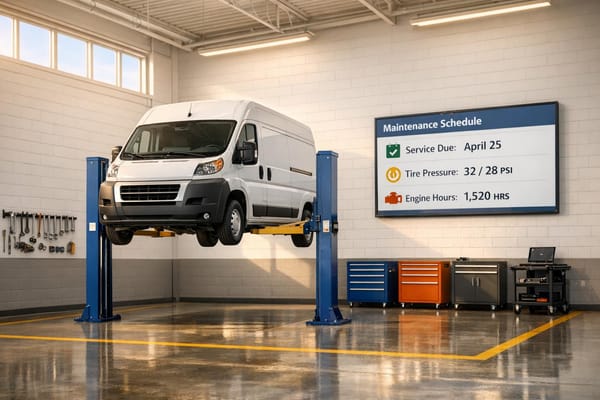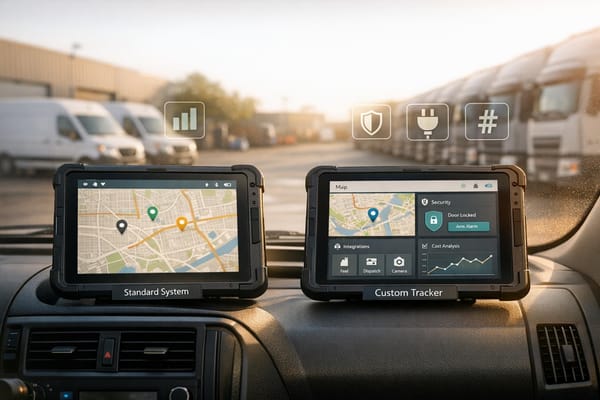Edge Computing in GPS Trackers for Heavy-Duty Vehicles
Explore how edge computing enhances GPS tracking for heavy-duty vehicles, improving speed, security, and cost-efficiency for UK fleet operators.

Edge computing is transforming GPS tracking for heavy-duty vehicles by processing data directly within the vehicle rather than relying on remote servers. This approach ensures faster data analysis, improved reliability in remote areas, and stronger data security. For fleet operators in the UK, it addresses challenges like poor connectivity, high operating costs, and compliance with regulations.
Key Takeaways:
- Faster Decisions: Local data processing reduces delays, enabling real-time tracking and quick responses.
- Improved Reliability: Operates effectively even in remote or harsh conditions, such as rural Scotland or construction sites.
- Enhanced Security: Limits data transmission, reducing cyber risks.
- Cost Savings: Reduces fuel usage, maintenance costs, and data transmission expenses.
- Compliance Support: Automates reporting for UK regulations, including driver hours and safety standards.
Edge-enabled GPS trackers also integrate with vehicle systems for diagnostics, geofencing, and predictive maintenance, helping fleets cut costs and improve performance. With dual-tracker systems and rugged designs, these devices are built to handle the demands of heavy-duty operations. Solutions like GRS Fleet Telematics offer affordable, flexible options starting at £7.99/month, making this technology accessible to fleets of all sizes.
What is Edge Computing?
Benefits of Edge Computing for Heavy-Duty Fleets
Building on the advanced data processing capabilities discussed earlier, edge computing brings specific operational advantages to heavy-duty fleets. It addresses the unique challenges these vehicles face on UK roads, offering improvements in speed, security, and reliability. These benefits translate into improved fleet performance and lower operational costs.
Faster Data Processing and Lower Latency
One of the standout benefits of edge computing is its speed. Studies indicate that edge-based systems can reduce response times to under 50 milliseconds for critical tasks, compared to over 200 milliseconds with traditional cloud-based systems.
"By leveraging edge devices, real-time data processing and analysis can be achieved closer to the source, reducing latency and enhancing the responsiveness of speed monitoring mechanisms." – Nadeem Haider and Shehzana Fatima
For example, during peak traffic hours, edge systems can dynamically adjust speed recommendations to ease congestion. In the UK's frequently adverse weather conditions, these systems can automatically lower speed limits based on real-time road condition analysis.
Additionally, edge computing achieves a 95% accuracy rate in detecting speed violations, outperforming traditional methods, which typically range between 85–90%. By integrating IoT sensors and machine learning, decisions are made locally within the vehicle, ensuring rapid responses when timing is critical.
Improved Security and Data Protection
Security is a top priority for fleet operations, particularly when transporting sensitive cargo or operating in high-risk areas. Edge computing enhances security by localising data processing and storage. This approach significantly reduces the risk of cyberattacks, as data travels shorter distances and remains on-site.
Features such as encryption and device-level firewalls add another layer of protection. By processing data locally, fleets also avoid vulnerabilities associated with transferring information across international boundaries, ensuring compliance with UK data protection laws.
With predictions that nearly 30% of data will require real-time analysis by 2025, the ability to process information on-site becomes even more critical. Fleet operators can analyse sensitive data immediately without exposing it to external networks, reducing the risk of breaches and malware attacks. This heightened security aligns with the physical durability needed for demanding environments.
Enhanced Reliability in Tough Conditions
Heavy-duty vehicles often operate in harsh conditions that can compromise standard computing systems. Edge computing devices are specifically designed to endure such challenges, ensuring consistent performance even with limited connectivity.
Rugged edge computers are built to withstand extreme conditions commonly encountered by heavy-duty fleets. They can operate in temperatures ranging from –40°C to 85°C, making them suitable for the UK's unpredictable climate. They are also engineered to handle up to 50Gs of shock and 5GRMs of vibration, essential for vehicles navigating rough terrain.
Many rugged edge systems feature fanless designs, preventing dust and debris from entering the device - an essential feature for vehicles operating in quarries, construction sites, or agricultural settings. Solid-state drives are used instead of traditional hard drives, ensuring reliability even under constant vibration and impact. These systems continue to function even when network connectivity is poor or entirely unavailable.
The demand for edge computing hardware reflects these reliability benefits. The market is projected to grow from £2.2 billion in 2019 to £14.5 billion by 2027, driven by industries requiring durable and high-performing systems. Remote management tools, such as Intel's vPro platform, further enhance reliability by allowing fleet managers to troubleshoot, update, and repair devices remotely. This capability reduces downtime and maintenance costs, which is especially valuable for fleets operating across the UK's diverse regions. Together, this reliability, combined with low latency and strong security, supports optimal fleet performance.
Features of Edge-Enabled GPS Trackers
Edge-enabled GPS trackers are a game-changer for heavy-duty vehicles, combining powerful on-device processing with features designed to handle the demands of fleet operations. These devices not only process data instantly but are also built tough to endure the challenging environments often faced across the UK.
Real-Time Tracking and Geofencing
One of the standout features of edge-enabled GPS trackers is their ability to deliver precise, real-time location updates directly from the device. Unlike systems that rely on sending data to remote servers, these trackers process information on-site, cutting down delays. For fleet managers, this means they can access accurate positioning details within seconds - a crucial advantage for vehicles operating across multiple locations or handling time-sensitive deliveries.
Geofencing adds another layer of functionality. Fleet operators can set up virtual boundaries around specific areas, such as construction sites or depots. If a vehicle enters or leaves these zones, the system sends instant alerts. This is particularly useful for managing large equipment or monitoring restricted zones.
Quick alerts also play a vital role in recovering stolen assets, significantly reducing potential losses. Since the processing happens on the device, notifications are sent immediately, avoiding the lag often seen with cloud-based systems. Together, these real-time capabilities pave the way for deeper integration with vehicle systems.
Vehicle System Integration and Diagnostics
Edge-enabled GPS trackers don’t just track location - they integrate seamlessly with vehicle systems via OBDII ports or hardwired connections. This connection allows access to engine data, fuel usage, and performance metrics. As a result, these trackers evolve into comprehensive fleet management tools, providing insights into location, speed, idle time, and even driving behaviour.
Continuous monitoring makes predictive maintenance possible, helping fleets address engine issues before they escalate. Driver coaching systems also benefit from this integration, recording events like speeding, harsh braking, and rapid acceleration . A prominent fleet operator reported better maintenance scheduling and reduced costs after adopting these tools. Additionally, fleets using AI-powered dashcams and coaching programmes have seen 22% fewer accidents.
"Our cutting-edge diagnostic services ensure your fleet is running at its best, providing accurate, real-time insight when you need it most." – Radius
For these features to work effectively, the devices must be durable and maintain reliable connectivity, regardless of the conditions.
Durability and Connectivity Options
Durability and connectivity are essential for edge-enabled GPS trackers, especially in the harsh environments heavy-duty vehicles often face. These trackers are built tough, with high IP ratings (IP67, IP68, IP69K) to resist water and dust, ensuring they perform consistently even in adverse UK weather.
Connectivity options like 4G LTE-M, NB-IoT, and 5G further enhance reliability. Whether in remote areas or urban settings, these devices maintain stable connections, ensuring uninterrupted data flow.
| Feature | Digital Matter Barra Edge | Amcrest GPS GL300 | Yabby Edge Cellular |
|---|---|---|---|
| Connectivity | 4G LTE-M, NB-IoT | 4G LTE | LTE-M / NB-IoT |
| Durability | IP68, IK07 | IP65 | IP68, IK06 |
| Battery Life | Up to 10 years (once daily updates) | 10–14 days (30-second updates) | 10+ years (cloud-based location solving) |
| Special Features | Indoor/outdoor tracking, magnetic switch | Geo-fencing, smart alerts | Cloud-based location solving, tip detection |
Take the Digital Matter Barra Edge, for example. With its IP68 rating, it is both waterproof and dustproof, and it operates in temperatures ranging from –30°C to +60°C. The Yabby Edge Cellular, on the other hand, offers over 10 years of battery life by using cloud-based location solving .
When choosing a GPS tracker, fleet managers should focus on devices with high IP ratings for durability. They should also weigh the trade-offs between update frequency and battery life to ensure the tracker meets their specific operational needs.
Applications of Edge-Enabled GPS Trackers in Heavy-Duty Fleets
Edge-enabled GPS trackers are transforming how heavy-duty fleets in the UK operate, offering much more than simple location tracking. These advanced systems tackle everyday challenges like fuel expenses, regulatory demands, and theft prevention, making them indispensable for fleet management.
Fleet Optimisation and Cost Savings
Edge computing, with its ability to process data locally, provides fleet managers with immediate insights into fuel consumption, routing, and vehicle usage. This real-time access to performance metrics allows for smarter decision-making, ultimately improving efficiency.
Research shows that businesses using advanced telematics have seen a 13% drop in fuel expenses and a 40% reduction in harsh braking incidents. These improvements not only extend the life of vehicle parts but also enhance driver safety. Impressively, 86% of connected fleet operators have reported reduced operational costs within a year of implementation.
"AI-powered analytics leveraging IoT, edge computing and the cloud are rapidly changing how fleet management is performed, making it more efficient and effective than ever." - Sumit Chauhan, co-founder and chief operating officer of Cerebrum X
Predictive maintenance is another game-changer. By identifying potential issues before they become major problems, downtime is minimised and vehicle lifespan is extended. Remote troubleshooting further streamlines maintenance by allowing technicians to diagnose and address problems without needing to be on-site. This not only saves time but also cuts costs by reducing unnecessary callouts. Additionally, processing data locally helps lower data transmission expenses and eases network congestion.
And it’s not just about operational efficiency - these systems also play a vital role in safeguarding fleet assets.
Security and Theft Prevention
Protecting valuable heavy-duty vehicles and equipment is a top priority, and edge-enabled GPS trackers offer robust security features. With real-time location updates, stolen assets can be recovered faster, and instant alerts notify managers of unauthorised movements. Some systems even come equipped with ignition kill switches, allowing vehicles to be remotely disabled if necessary.
"Discover enhanced vehicle security with Trackhawk GPS's cutting-edge GPS tracking device featuring a built-in ignition kill switch that can be remotely activated from anywhere in the world." - Trackhawk GPS
Geofencing adds an extra layer of protection. These systems can send alerts when vehicles enter or leave specific zones, such as depots or construction sites. Beyond security, the presence of these trackers often qualifies fleets for insurance discounts, as insurers value the added security and recovery capabilities.
Regulatory Compliance and Reporting
Edge-enabled GPS trackers also simplify the complex task of adhering to UK fleet regulations. From monitoring driver working hours to meeting environmental standards, these systems automate compliance processes. Reports on vehicle usage and driver behaviour are generated automatically, reducing the risk of manual errors and providing a clear audit trail for inspections.
"With Fleetsmart's tracking system, businesses can ensure that they remain compliant with legal requirements by monitoring working hours and ensuring that drivers adhere to safety guidelines." - Fleetsmart
Driver behaviour tracking - such as monitoring speeding, harsh braking, and rapid acceleration - helps improve road safety. These insights enable fleet managers to create targeted training programmes, boosting safety scores and ensuring compliance. By processing compliance data locally, edge computing ensures quick response times, allowing managers to address potential violations before they escalate.
"Every second counts in fleet management."
When choosing a tracking system, fleet managers should ensure it aligns with their specific needs, considering factors like vehicle types, typical routes, and behaviours requiring oversight. The best solutions combine real-time tracking with robust reporting features to meet both operational goals and regulatory demands.
GRS Fleet Telematics: Leading Solutions for UK Fleets

GRS Fleet Telematics brings cutting-edge tracking solutions to heavy-duty fleets across the UK, leveraging the benefits of advanced technology to meet the unique demands of these operations. Their integrated systems are designed specifically for heavy-duty vehicles, offering robust security and seamless monitoring.
Advanced Features for Heavy-Duty Vehicles
GRS Fleet Telematics addresses the challenges of heavy-duty fleets with its dual-tracker technology, ensuring a higher level of security and reliability. This system pairs a primary tracker with a backup, guaranteeing uninterrupted monitoring even if one device fails or is tampered with.
The system also includes an integrated immobilisation feature, allowing fleet managers to remotely disable vehicles when necessary - an invaluable tool for fleets operating in remote or high-risk locations, such as construction sites or logistics routes.
Key features include:
- Real-time tracking for precise vehicle location updates.
- Driver behaviour analysis to improve safety and efficiency.
- Geofencing alerts that notify operators of unauthorised movements.
With a 91% recovery rate for stolen vehicles, this technology has proven its effectiveness. The dual-tracker approach makes it significantly harder for thieves to disable the system, boosting recovery success and minimising losses.
Affordable Pricing and Flexible Plans
GRS Fleet Telematics offers budget-friendly pricing, with a subscription starting at just £7.99 per month. This fee covers SIM data, account management, and platform access, ensuring predictable costs without unexpected data charges.
To cater to varying needs and budgets, three hardware packages are available:
| Package | Hardware Cost | Key Features | Best For |
|---|---|---|---|
| Essential | £35 | Single wired tracker, real-time tracking | Fleets needing basic monitoring at a low cost |
| Enhanced | £79 | Primary tracker + Bluetooth backup | Medium-risk operations requiring extra security |
| Ultimate | £99 | Dual trackers + immobilisation | High-value vehicles needing advanced security |
The pay-per-recovery model removes upfront recovery fees, so fleet operators only pay for recovery services when needed. This keeps overall costs manageable while ensuring access to professional support during emergencies.
Additionally, free installation is offered when paired with GRS Fleet Graphics branding services, giving businesses the chance to enhance their corporate image while implementing tracking solutions.
Support and Customisation for UK Fleets
GRS Fleet Telematics provides tailored solutions to meet the specific needs of industries across the UK. Whether for construction, logistics, or service-based fleets, their flexible features adapt to various operational demands.
Through GRS Fleet Graphics, companies can access UK-wide branding services for heavy-duty trucks and commercial vehicles. This integrated approach allows businesses to manage both tracking and branding through a single provider. Services include Chapter 8 Highways and emergency vehicle graphics, ensuring compliance and visibility for fleets operating in high-visibility environments.
Other key offerings include:
- 24/7 recovery support, ensuring assistance is always available for stolen vehicles or emergencies.
- Vehicle vinyl wraps, which protect assets while maintaining a professional appearance.
- White-label branding options, allowing large fleets to customise the platform with their branding for consistent corporate identity.
Conclusion
Edge computing is reshaping how GPS tracking systems function in heavy-duty vehicles by moving data processing from distant servers directly into the vehicles themselves. This shift brings crucial advantages for UK fleet operators, particularly as industries like construction, logistics, and services face growing operational challenges.
By processing data on-board, fleets can overcome issues like slow emergency response times, security risks during data transmission, and unreliable connectivity in remote areas. This localised approach not only speeds up response times but also cuts costs by reducing the need for extensive data transmission.
Key Benefits for Fleet Managers
For fleet managers, these technological improvements translate into three major operational advantages:
- Real-time data and route optimisation: These tools help lower operational costs and improve profit margins.
- Enhanced security: Keeping sensitive vehicle and route data within local networks reduces the risk of breaches.
- Predictive maintenance: Continuous monitoring of vehicle performance allows early detection of potential issues, cutting maintenance costs and improving vehicle uptime.
Beyond these operational gains, there are financial perks. Automated compliance reporting and monitoring of driver hours, vehicle weights, and route restrictions ensure adherence to strict UK regulations, easing the administrative burden.
How GRS Fleet Telematics Elevates Fleet Management
GRS Fleet Telematics leverages edge computing to revolutionise fleet operations. Their dual-tracker technology ensures reliable tracking even in areas with poor connectivity, achieving an impressive 91% recovery rate for stolen vehicles.
The technology is offered at flexible pricing, starting at just £7.99 per month. Customers can choose from three hardware tiers: Essential (£35), Enhanced (£79), and Ultimate (£99). Additionally, GRS Fleet Graphics services integrate professional branding with vehicle tracking, simplifying operations while maintaining a polished business image.
Looking ahead, the rise of 5G will further amplify these capabilities. With projections suggesting that 70% of new cars will be 5G-enabled by 2030, early adoption of edge-powered GPS systems allows UK fleets to embrace technological advancements without overhauling current setups.
For heavy-duty fleet operators in the UK, adopting edge computing in GPS tracking isn’t just a tech upgrade - it’s a strategic move. It offers better efficiency, stronger security, and reduced costs, while also ensuring compliance and safeguarding assets. As outlined, the combination of edge computing and advanced tracking solutions is essential for modernising fleet management in today’s demanding environment.
FAQs
How does edge computing enhance the performance and security of GPS trackers in heavy-duty vehicles?
Edge computing transforms how GPS trackers function in heavy-duty vehicles by handling data right at the source or nearby, instead of depending on distant cloud servers. This localised processing means quicker updates and fewer delays, even in areas with patchy network coverage, ensuring real-time tracking stays consistent.
When it comes to security, edge computing adds an extra layer of protection by keeping sensitive information closer to its origin. This reduces the risks associated with data transmission and allows for faster detection of tampering or unusual activity. The result? Safer and more dependable fleet operations. It's a powerful shift in how fleet management is handled, combining efficiency with enhanced safety.
How do edge-enabled GPS trackers help reduce fleet management costs?
Edge-enabled GPS trackers are a game-changer for fleet management, especially when it comes to cutting costs. By handling data processing locally, these devices reduce the need for constant data transmission, which means lower bandwidth expenses. On top of that, they enable real-time data analysis, helping fleet managers stay ahead of vehicle maintenance needs. This proactive approach not only trims down repair bills but also helps vehicles last longer.
These trackers also boost efficiency in day-to-day operations. They can optimise routes to save on fuel, monitor safety to lower insurance premiums, and generally improve overall fleet performance. Many fleet managers have seen noticeable savings, particularly in fuel costs and expenses tied to accidents. For those looking to manage budgets effectively, edge-enabled trackers are a smart choice.
How do edge-enabled GPS trackers help UK fleets comply with regulations and simplify reporting?
Edge-enabled GPS trackers simplify compliance with UK fleet regulations by processing data right within the vehicles. This allows for real-time tracking of driving hours, rest periods, and vehicle usage, ensuring precise and up-to-date records that align with legal requirements.
By automating data collection, these trackers make reporting much easier for fleet managers. They also provide tools to monitor driver behaviour and vehicle maintenance, helping fleets stay compliant with safety standards and operational guidelines. This hands-off approach not only cuts down on tedious admin work but also boosts efficiency for fleets operating across the UK.




